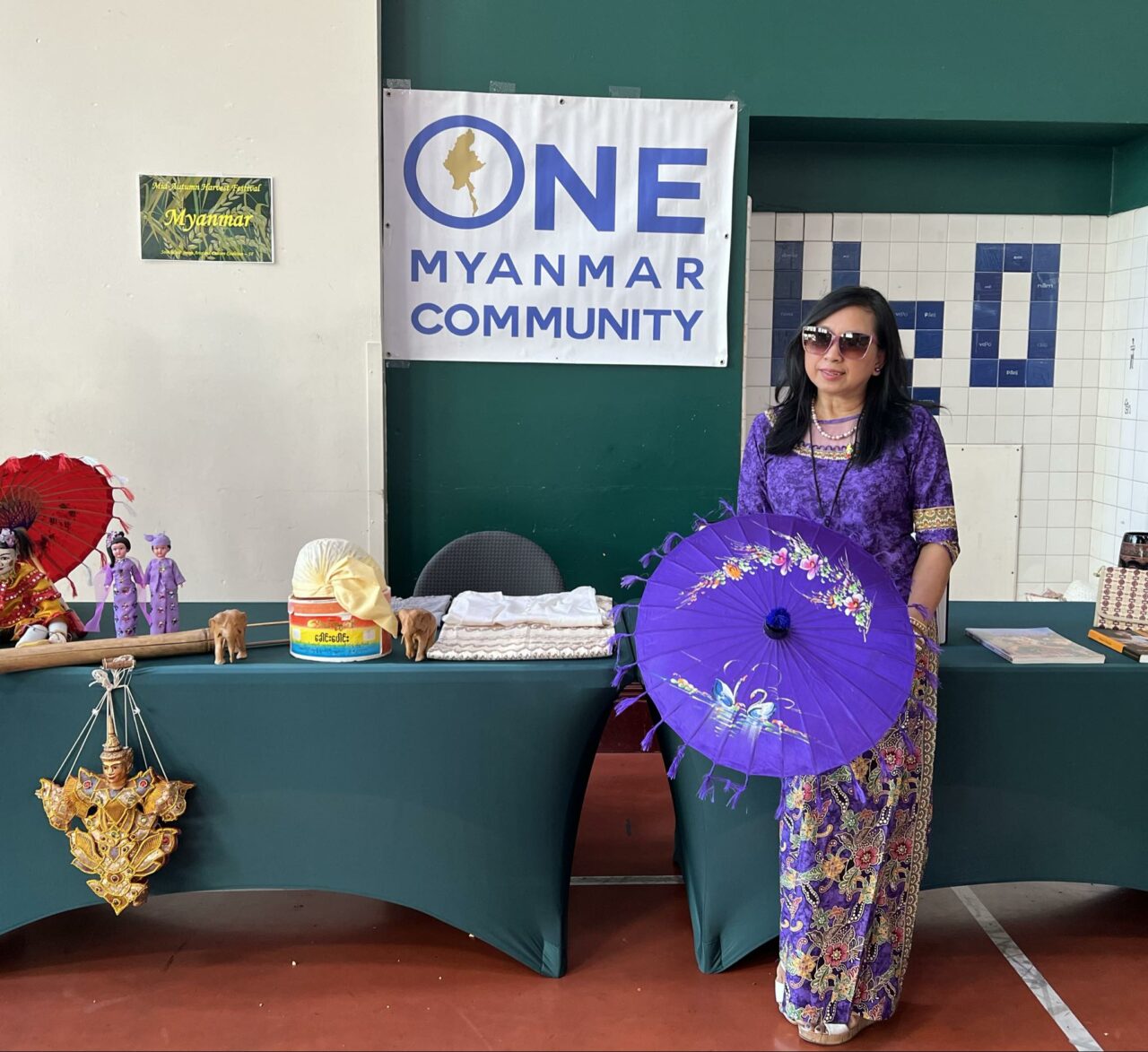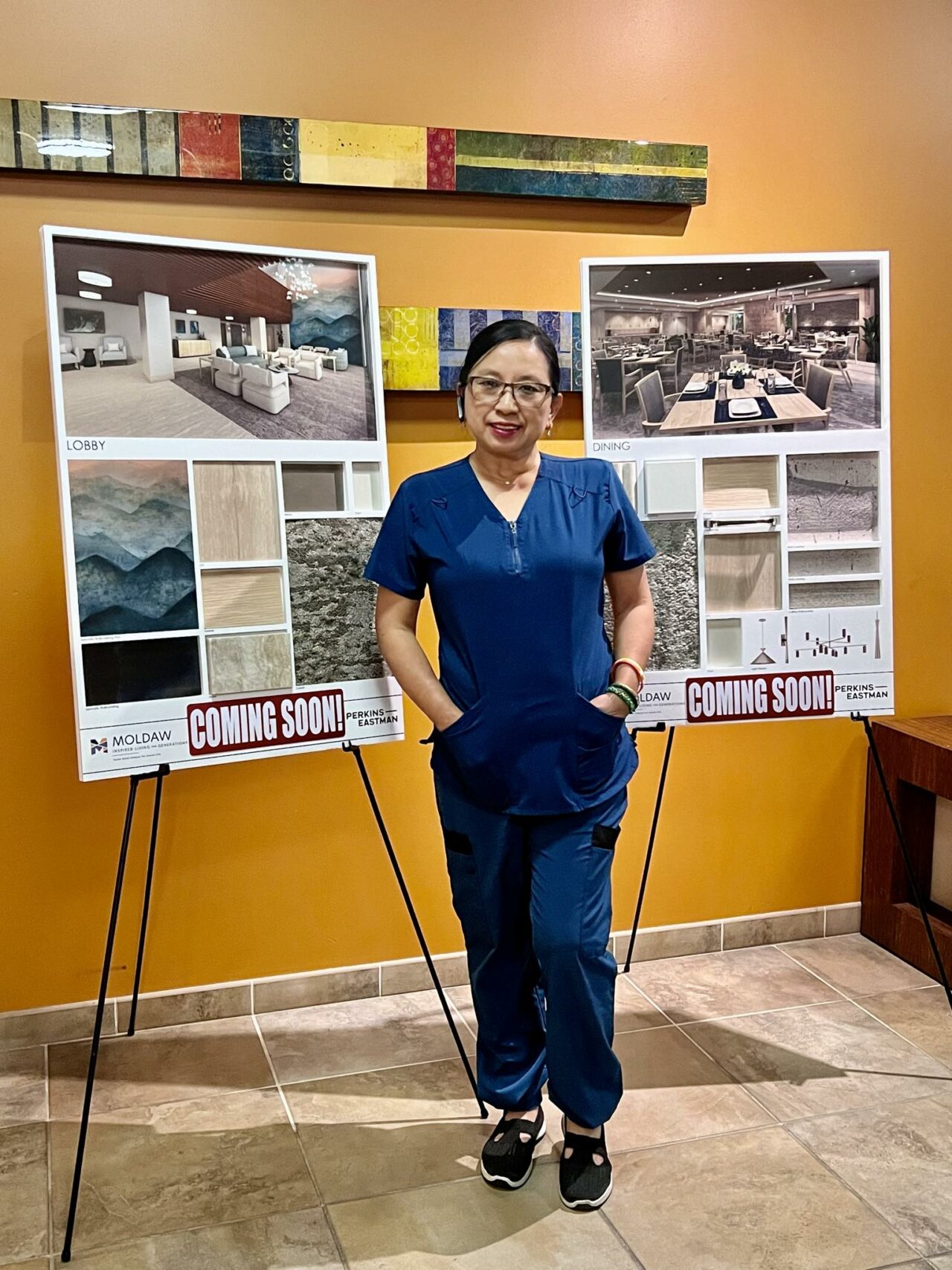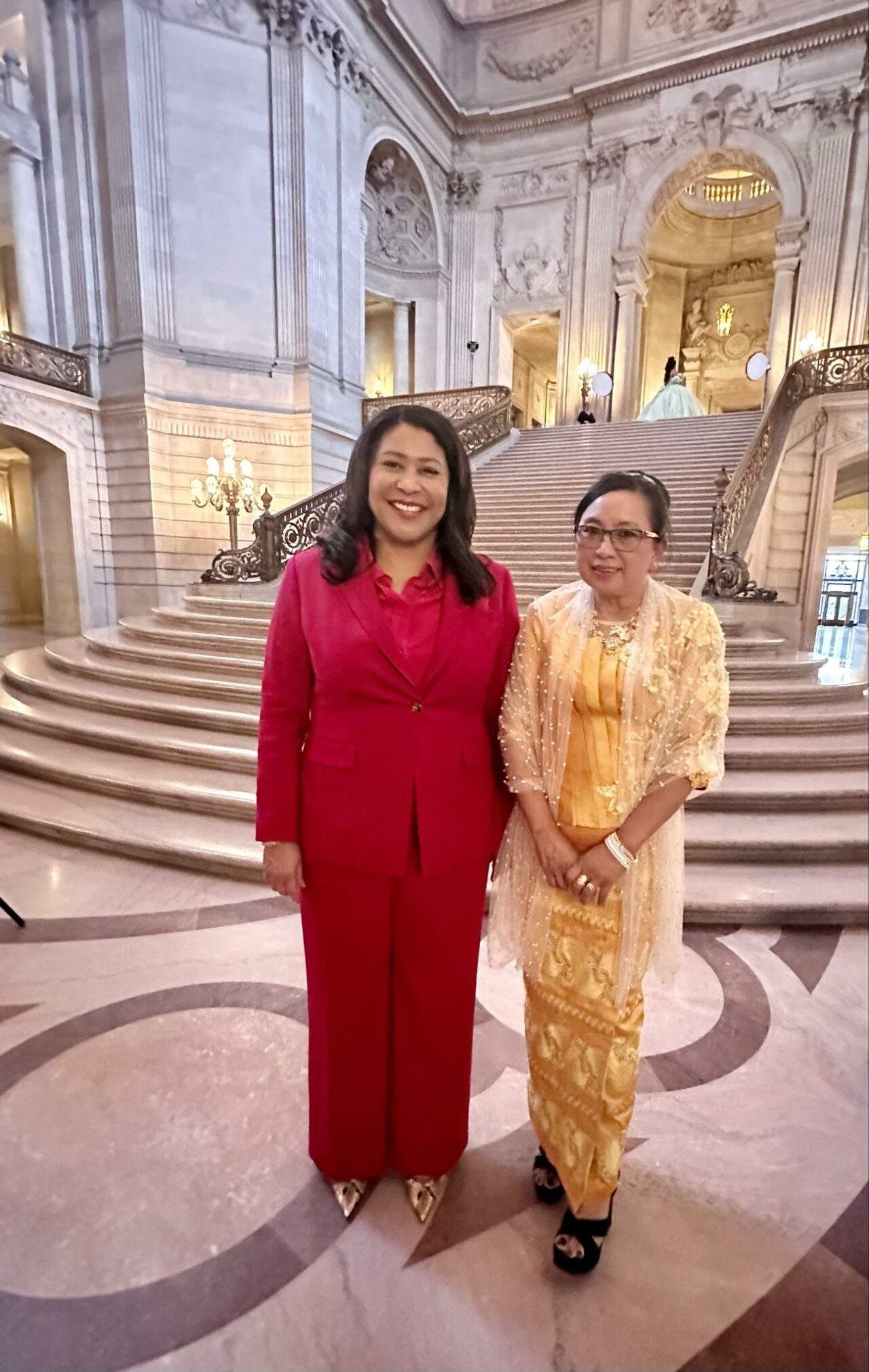Six Years Strong: A California Caregiver’s Journey as a Community Activist – by SweSwe Aye

Swe Swe Myint, in her mid-50s, immigrated to the US with her family in 2000 through the Diversity Visa program. Originally an elementary school teacher in Burma, when her husband underwent two heart surgeries, she made the decision to become a caregiver after completing an online caregiver certification Program in 2018. Swe is a Fremont resident and a dedicated member of the One Myanmar Community organization in the San Francisco Bay Area.
Burmese social norms and the nature of caregiver work
In Burmese culture, there is a preference for caregivers and the clients to be of the same gender unlike in western countries. When Swe moved to a western country like America, she faced the challenge of adapting to cultural differences while trying to maintain her own cultural values.
Another obstacle she encountered was the language barrier, especially when interacting with non-Burmese clients from different ethnic backgrounds. Swe recognized the importance of improving her English proficiency to better communicate with her clients. She devoted an hour every day after work to practice speaking English, often engaging in conversations with her daughter, who was born in the United States.
“My family members well understand my work and support me from the sidelines,” commented Myint, underscoring the significance of familial encouragement in overcoming challenges for her career advancement.
Significant challenges in the community
A significant challenge faced by caregivers in the Burmese community is the narrow perspective regarding caregiver work. Many Burmese immigrants, having endured years of racism and military dictatorship in Burma often view caregiving, including tasks like personal hygiene assistance, as less prestigious. This perception creates an additional obstacle for caregivers. Developing an open-minded attitude and recognizing the positive aspects of the caregiving job is essential. Some family members of elderly clients fail to distinguish between caregiving and domestic service, viewing caregivers as household maids. This lack of differentiation underscores the importance of establishing mutual respect between caregivers and their clients’ families within the community. Bridging this gap in understanding and perception is crucial for fostering positive relationships between both parties.
Cultural Competence

In caring for elderly Burmese individuals, there is a distinct preference for Burmese caregivers because effective communication rooted in cultural comprehension is vital. The seniors enjoy sharing their cherished memories from Burma, including customs and landmarks. They seek compassionate listeners who can empathize and engage harmoniously.
Swe, reflecting on her caregiving experiences, emphasized the significance of providing emotional support beyond physical care. She recounted how reciting Buddhist prayers to a senior woman before bedtime instilled a sense of security. In Burmese culture, customs such as removing shoes upon entering a house, assisting the senior clients with religious practices like serving the monks visitors especially on their birthdays and on the holy days.
Dealing with diversity
In a country as diverse as the United States, Swe aims to become a skilled and dedicated caregiver, providing top-notch service to individuals of all skin colors. She is confident in her ability to serve beyond Burmese clients. Swe emphasizes the universality of aging. She believes quality care should be available to all elderly and incapacitated individuals, regardless of race or ethnicity. “Every individual deserves equal access to compassionate and competent care from us.”
When caring for non-Burmese clients, Swe initially encountered challenges in communication and culture differences. Despite the initial hurdles in navigating cultural disparities, within a month, both the clients and Swe were able to establish a harmonious working relationship.
Swe adapted to her homemade food preferred clients’ tastes by learning new recipes of spaghetti, potato salad, and mushroom soup, through YouTube. She also observed cultural differences in expressions of gratitude, as her devout Christian clients would express thanks through prayers, to which she would joyfully respond with “Amen.”
She acknowledges that failure to understand and respect cultural values could undermine the delivery of high-quality care for the clients.
Daily routine work
Swe visits elderly homes in the morning, preparing meals, helping taking medications, handling chores, checking blood pressure, and assisting with diabetes care. For clients needing help with toileting, she ensures proper cleaning and timely diaper changes to prevent sores. She assists with walking and provides support to those with weak legs or paralysis. “The longer my career pathway, the more I have learned the importance of compassion,” Swe said. She has found fulfillment in caring for her senior clients, treating them with the same level of care and respect she would give to her own parents.
Patience is key
Swe emphasizes the importance of mindfulness in addition to physical tasks. ” It’s crucial to avoid any mistakes for helping them taking medications. When feeding seniors, precautions must be taken to prevent choking.” Swe explained. Some senior clients may exhibit agitation or aggression due to mental health issues or medication side effects. “Patience is key” she added.
Struggles in the pandemic era

During the Covid-19 pandemic, frontline caregivers operated similar responsibilities as the healthcare professionals. Swe reflecting on her experiences during this time, recounted, ” I ensured all necessary documentation for travel and attended to my clients’ needs during the lockdown was enforced. We underwent Covid testing every two weeks and followed strictly to Covid-19 protocols. We know we had anti-Asian hate risks too”.
A caregiver as well as a dedicated community activist
Swe emphasized the seamless integration of her caregiver responsibilities with her volunteer commitments. At the 20th annual Heritage Month celebration organized by the APA Heritage Foundation in San Francisco on May 1st, Swe displayed her cultural heritage by performing traditional Burmese dance with two other fellow dancers. She expressed, “Participating in community work relieves daily stresses and renews my energy to pursue my caregiving career.”
California’s population over 60 in 2030
At the media briefing hosted by the California Department of Aging and Ethnic Media Services on March 7, Renita Polk, Ph.D., Assistant Director, Office of Direct Care, Workforce, California Department of Aging, said that California’s population over 60 will hit 10.8 million in 2030. A quarter of residents will need care, creating a demand for skilled caregivers and an expected shortage of up to 3.2 million workers in California. Based on US census estimation, by 2030, one in every five residents will reach retirement age. “Caregivers and home healthcare workers play a pivotal role as the backbone of California’s healthcare system, and it is critically important that we support this career pipeline as we look toward the years to come,” she added.
CalGrows
California Department of Aging launched CalGrows program on June 5, 2023, offering free training for caregivers, including paid workers, Home and Community-Based Services caregivers, and unpaid family and friends. Participants may get up to $6,000, but the program ends on August 30. https://www.calgrows.org/caregiver-trainings
The US Census Bureau’s 2016-2020 American Community Survey shows Burmese population in the US is 169,915. California ranks fourth in Burmese population, with 18,780 residents, making up 0.4% of the state’s Asian population. Pew Research Center showed that additional 7,300 Burmese immigrants in the US are eligible for Temporary Protected Status until November 2025.
Swe, a seasoned caregiver professional, and dynamic community advocate, is encouraging both established and new Burmese immigrants aspiring to become skilled caregivers in California to enroll in the CalGrows program www.calgrows.org before time runs out. “Our community requires adept and culturally competent caregivers. CalGrows is a unique and advantageous opportunity for our Burmese immigrants, particularly newcomers seeking well-compensated professional positions in California.”
This article was written with support from the EMS – CalGrows Fellowship Program.
The fellowship aims to spotlight and celebrate home health care providers as essential — unsung heroes — to the health and wellbeing/quality of life of older adults and people with disabilities, a population that represents out of four Californians as of 2030.
If you are interested in becoming a professional caregiver in California, the backbone of California health care, to earn up to $6,000 for learning and using new skills. However, time is running out for caregivers to sign up, as the program ends in August. Caregivers can sign up for the program online at calgrows.org, by phone at (888) 991-7234 or by email at help@calgrows.org.

